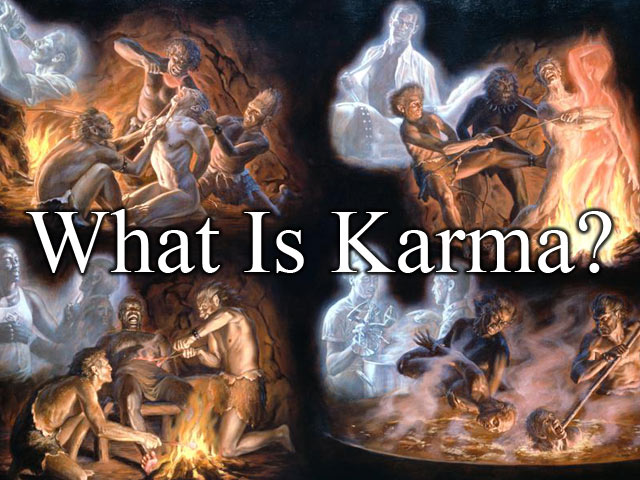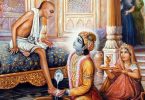Question: Will the karma of parents affect children or not? In other words, will good or bad reactions destined for parents be shared by the children? I had to disagree because of the following reasons:
1) It seems unfair that a living entity A has to get the results of another living entity’s (say B) karma which is done as a result of B’s free will (and modes of material nature & super soul sanctioning it).
2) If we think of the story of Sri Prahlad, Hiranyakasipu did so many sinful actions – but Prahlad didn’t get the reactions for those. One may argue that Prahlad is an exception as he is a devotee and heard Srimad Bhagavatam in the womb. But Kayadu (wife of Hiranyakasipu) heard Srimad Bhagavatam as well. But she didn’t have a transformation.
3) The story of Valmiki – when Valmiki was a hunter and he asked his wife and children whether they will partake in his karma as he was performing sinful activities for their benefit, they replied that is not possible (this is how I remember the story).
Can you please tell me what is correct answer to this question? If there are specific scriptural references then that will help very much.
Answer by Romapada Swami: According to scriptural information, consequences of one’s actions do affect family members and descendants. This can be seen even from ordinary commonsense. If the father becomes a criminal, naturally the rest of the family suffers the consequence, even if they themselves are not legally punished. Similarly, when the child is foolish or sick, the parents suffer by association and attachment.
This is one of the basis of Arjuna’s argument – the irresponsible behavior of a man, a head of family, or a public leader will involve the entire family or community in irreligion, women will be polluted, children will degrade, and forefathers will suffer– all due to one person’s or group of person’s improper decision. (BG Chapter1) Human life is therefore a life of great responsibility.
It is not unfair because each person is responsible for his own duties in relation to Krishna. By turning away from Krishna and falsely identifying with the body and its relations, one becomes involved in the vicious network of karma. One can remain unaffected, like lotus leaf in water, if one is always engaged transcendentally in a mood of service. Prahlada was not only unaffected but also delivered his father. (see quote below)
Oct 9, 1968 to Satsvarupa: “First of all they act sinfully, and when there are reactions in the form of war, pestilence, famine, and so many other natural disturbances, they pray to God to stop them. This is not possible.
They are just like criminals: first of all a criminal commits theft, burglary, and debauchery, and when he is captured by the police force, he prays to the government to stop his punishment. That is not possible. So, people are engaged in many sinful activities, and by nature’s law there must be a reaction.”
SB 4.20.14 “To give protection to the general mass of people who are citizens of the state is the prescribed occupational duty for a king. By acting in that way, the king in his next life shares one sixth of the result of the pious activities of the citizens. But a king or executive head of state who simply collects taxes from the citizens but does not give them proper protection as human beings has the results of his own pious activities taken away by the citizens, and in exchange for his not giving protection he becomes liable to punishment for the impious activities of his subjects.”
SB 1.19.2 “[King Parikshit thought:] Due to my neglecting the injunctions of the Supreme Lord I must certainly expect some difficulty to overcome me in the near future. I now desire without reservation that the calamity come now, for in this way I may be freed of the sinful action and not commit such an offense again.”
(part of the PURPORT) … Maharaja Parikshit concluded that his insulting a powerful brahmana was certainly to be punished by the laws of the Lord, and he was expecting something very difficult in the very near future. He therefore desired the imminent calamity to fall on him and not on his family members. A man’s personal misconduct affects all his family members. Therefore Maharaja Parikshit desired the calamity to fall on him alone. By suffering personally he would be restrained from future sins, and at the same time the sin which he had committed would be counteracted so that his descendants would not suffer. That is the way a responsible devotee thinks. The family members of a devotee also share the effects of a devotee’s service unto the Lord. Maharaja Prahlada saved his demon father by his personal devotional service. A devotee son in the family is the greatest boon or blessing of the Lord.
Lecture Srimad-Bhagavatam 1.7.32-33 — Vrndavana, September 27, 1976: “How in the family one become enemy? Canakya Pandita has analyzed how in the family we can become enemies of one another. Canakya Pandita says, rna-karta pita satruh: “A father in debts to others is enemy.” Rna-karta pita satruh. Because according to Manu-samhita, the son inherits the property of the father. That is everywhere. So Manu-samhita also makes responsible the son for the father’s debt. Nowadays, if my father is debtor, I am not responsible. But according to the Vedic laws, the son is responsible the father’s debt. Because he inherits the property, why he shall not inherit the debts of the father? According to Manu-samhita law he is obliged to pay the debts of the father. We have seen one very practical example. Even fifty years ago, in Calcutta there was a very big barrister. He was a political leader. He was Mr. C.R. Das. So his father died insolvent. His father was also very respectable man, but later on he became so much debtor that he died insolvent. Declared… This Mr. C. R. Das, he did not get any property from the father, but by his practice as a barrister he became very rich man. In those days his monthly income was fifty thousand rupees. So he called all the creditors of his father and paid paisa to paisa, that “My father died in debtor. Now I have got money, you can take.” So this is the duty of the son. But if one is poor man, he cannot pay. So he becomes a subject matter of criticism. Under the circumstances the father becomes the enemy.
Another example is of a chaste wife receiving, in this case, the benefit of her husband’s spiritual advancement.
SB 3.23.1 purport “The wife is dependent on the husband, and if the husband is a Vaishnava, then naturally she shares the devotional service of the husband because she renders him service.”
SB 6.19.18 purport “The relationship between husband and wife is firmly established when the wife is faithful and the husband sincere. Then even if the wife, being weaker, is unable to execute devotional service with her husband, if she is chaste and sincere she shares half of her husband’s activities.”







